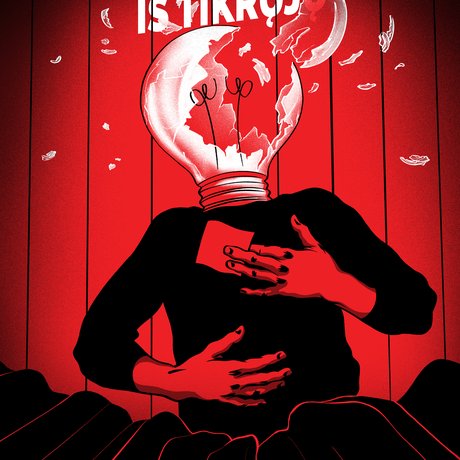This year play reading festival “Dramokratija” invited participants to write about propaganda. It also provided three workshops with lecturers from Germany, Russia and Lithuania where playwrights developed their ideas and worked on writing. The workshops whioch took place in Goethe instutute in Vilnius ended with a virtual get together with participants, lecturers Theresia Walsewr (from Germany), Mikhail Durnenkov (from Russia) and Gabrielė Labanauskaitė (Lithuania) where everyone shared their experiences during the workshops.
Lithuanian playwright, poetess, writer, establisher of the “Dramokratija” festival and lecturer of the last workshop Gabrielė Labanauskaitė told that organizers wanted a variation of opinions and positions and invited lecturers from Germany and Russia - Theresia Walser and Mikhail Durnenkov. „It’s like participants got a cocktail mixed from various ingredients” – G. Labanauskaitė was saying.
The lecturers of the workshops differed not only in their methods but also in their political views which still had something in common – refusal to give in to dominating systema dn fight destructive ideas with arts. Lithuanian lecturer was glad worskhops took place: “In my opinion, lecturers from different countries offered huge possibilities which may not be comprehended or understood so soon after and probably every participant will have a different door to openb for them. But it is true that it is extremely useful to hear your play read in different language, to have an opinion of a person from different theatre school who also lives in the different part of the world.“
For the participants all the workshops and excercises varied in methods and atmosphere but all got some useful advices for themselves and their writing. LMTA screenwriting forst year student Rinaldas Tomaševičius told that at the first workshop he felt like a child who has never seen a toy and thanke lecturers for showing these toys and teaching how to play with them.
“Creative excercises are like a journey – participating playwrights are half way done, there are a lot of things to do but they have a clear direction.” - said Gabrielė Labanauskaitė. “Every lecturer brought the best they have to the workshops”. Gabrielė was analyzing plays of the participants and proganda plays from the early XX century.
G. Labanauskaitė told that the subject for this year festival was born in cooparation with embassy of Germany: “Special thanks goes to Anna Nowodworska who was one of iniciators of the idea and collaborator between the festival and the embass. Both wanted to talka about relevant and important social issues, especially at the moment when there is such a stormy and fast changing potical landscape in the world and we all realise how strongly it influences our daily life.”
In the discussion on propaganda all the lecturers, T. Walser, M. Durnenkov and G. Labanauskaitė agreed that propaganda makes world a very simple place – it draws everything only in black and white, tag friends and enemies but life is much more colorful than that. Dovilė Katiliūtė, an upcoming playwright who experimented with fairy tale and documentary theatre during the workshops, noted that one can find propaganda in all subjects of daily life. Russian playwright M. Durnenkov added that when he cam back to Moscow he re-valued the works of the participants and noticed that they are more than just propaganda – it is just a tool to write about what is important for the playwrights.
The participants are going to finish their plays by 5th of February and on 26th of February will start formation of the teams. All the plays will be read next spring, during the “Dramokratija” festival which will take place on 16th-22nd of April and invite everyone to free play readings. Follow ”Dramokratija” on Facebook and Instagram for the updates.
Festival is sponsored by - Vokietijos ambasada, Geothe institutas.
Partners of the festival - LMTA, LMTA SA, Teatro sąjunga.




